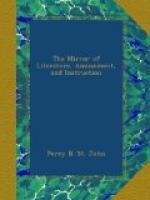* * * * *
GOETHE
[Illustration: GOETHE]
John Wolfgang von Goethe was born at Frankfort, August 28, 1749, and died at Weimar, March 22, 1832, aged eighty-two years and seven months. He was a sickly child, and consequently participated but little in children’s pastimes. Youth—melancholy, or early habits of reflection, and an independence on others for amusement or formation of opinions were thus generated, which, operating on his exquisite organization, contributed to make him the master-spirit of his age. Thus, in his autobiography and diary, it is highly instructive to mark the effect of the various circumstances in which he was placed, on his train of thought. Events, which on most children’s minds “are only reflected as on looking-glasses but make no impression,” produced an effect on him of which the influence was never effaced. The coronation of Joseph II. at Frankfort, the annual mass, and the noble old city itself, with its associations of feudalism and German art, are portrayed by him seventy years after the feelings they had excited, with all the vividness of yesterday’s impressions. It is probable that no one ever possessed such acute sensibility as Goethe. He could “hang a thought on every thorn.”
Goethe’s father was a man of easy circumstances, and of some literary merit: he had a great love for the fine arts, and had made a small collection of objects of virtu in his travels through Italy. All this worked on the young poet, and at eight or nine years old he wrote a short description of twelve pictures, portraying the history of Joseph. At fifteen years of age he went to the university of Leipsic, where he studied law; he took the degree of doctor at Strasbourg. In 1768 he left Leipsic, and after a short tour settled for some time in Alsace, where the beautiful Gretchen won his heart, and obtained for herself in Faust and Egmont, a more lasting monument than brass. On leaving Alsace, he returned home; but soon left it again to practise in the Imperial Chamber at Wezlar. Here he witnessed the tragical event that gave rise to his romance of the Sorrows of Werter. In 1775, he went to Weimar, on an invitation from the Grand Duke, and remained there till the end of his life, loaded with all the honours a German sovereign could bestow, ennobled, a privy councillor, and for many years of his life prime minister; “a treatment of genius hitherto unknown in the annals of literature, or of Mecaenaship; and a splendid exception to the indifference with which rulers generally regard intellectual excellence.”




